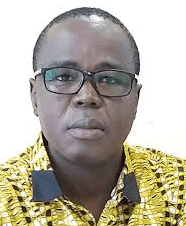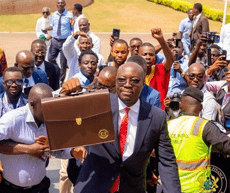I had the opportunity to participate in the second edition of the AgriFood Future in Selormo, Italy at the invitation of President Andrea Prete of Unioncamere and Professor Alexander Giordano, founder of Rural Hack few weeks ago.
My presence and observations has marked and sparked a mind transformative perspective, of our collective ambition for the future of food and the positioning of Ghana and Africa as a whole, in the overall Agrifood future agenda.
What is AgriFood future?
The Agrifood Future is a national event that aims to offer a moment of discussion on food innovations, ecological transition, digital transition and sustainability.
As we may all be aware, the food system is one of the main drivers of change in the world’s ecosystem and is, at the same time, deeply affected by major climate and geopolitical changes.
On the horizon looms the need to feed the 10 billion people who are expected to live on the planet Earth in 2050 and it is, therefore, necessary to rethink the methods of production, processing, transport, packaging and consumption of food to reduce the footprint of these activities on the environment and ecosystems.
Agrifood Future is one of the first events in southern Italy that focuses on 8 of the 17 Sustainable Development Goals (SDGs) that constitute the vital core of the 2030 Agenda.
The AgriFood Future is dedicated to the future of the Agri-food sector. A future that is not only exclusively Italian but global.
It was held in the province of Salerno, which has a high level of economic value in the agri-food sector.
The five(5) day AgriFood future event, was successfully delivered under the theme, Building a Sustainable Business In the Food Systems with AI,
It was a gathering of Agricultural change makers and think tanks in Technology and innovation, passionate young people across Italy who demonstrated through the Summer School, their strategic approaches and power to drive change, actors within the value chain and public and private sector leaders.
For President Prete, Prof Alex and myself, my participation was a commitment to highlight the critical role of cross-continental collaboration in addressing pressing agricultural challenges and capitalizing on opportunities within agritech and food systems. This we all agree is in the right direction.
The Agrifood Future event had two strategic approaches; one key part was leveraging the enthusiasm and innovative capacities of youth to enhance food security, promote sustainable practices, and influence agricultural policies, by connecting young minds.
This was successfully executed through the Summer School.
The other strategic sessions, leveraged on the strengths of experts within the industry to discuss diverse topics in innovation and digital approach which can aid to advance and sustain the future of food.
I could see the program’s immense significance in offering huge benefits to Ghana, Africa and the Caribbean regions through its platform for the exchange of knowledge, technology, and expertise.
The AgriFood Future program for me, represents a much more advanced and crucial mechanism for supporting Africa’s agribusinesses and the broader agricultural ecosystem.
As climate change, shifting consumer demands, and global trade policies reshape the agrifood landscape, the knowledge and technology shared at this event will be instrumental in equipping African countries with the tools needed to thrive.
The event adequately served as an effective facilitator of meaningful collaborations.
As I interacted with fellow participants, it became evident that there is a growing interest in fostering partnerships between African and European institutions.
This was evident also in my forty-five minutes interactive session with President Prete.
Italian stakeholders, like President Prete believes so much in the energies of Africa to solving the global food crisis and the desire for Africans at a large, to be part of further strengthening and developing the AgriFood Future event is a stronger agenda and commitment to the entire organization.
The AgriFood Future participants were particularly impressed with Agrihouse Foundation’s successful advocacy and interventional modules in contributing to the Food security agenda.
The most important part for us all, is our commitment to work together to further expand the AgriFood future event, so more actors across Africa, the Carribean and Meditterean to be a part of this movement of change and to contribute meaningful in all dialogues, that will positively influence our food systems.
As changemakers and influecers in our respective fields, we remain the frontline in the movement to change the food security equation across the globe today.
AgriFood Future believes that the influence from both Africa and the European community can be transformative and thus, the need for a stronger presence in future events and related activities.
I stand with AgriFood Future also, in their submission on Food and its linkage to sustainability.
The future of food and the food chain as a whole is linked to sustainability.
We must thus all unite with one call and commitment to promote sustainability, through innovative approaches and technology. This is one major take home, also from the AgriFood future event.
I would also like to place a spotlight on the AgriFood Future’s program flow, set-up and format, which sufficiently allows room for networking and the exchange of ideas, and I found that very invaluable.
The rich tapestry of experiences shared by participants not only inspired dialogue but also paved the way for future projects that can address pressing agricultural issues both locally and globally.
I am optimistic about the future of the agri-food sector.
The collective expertise and innovative ideas presented during AgriFood Future 2024 have the potential to drive significant change in the future of agri-food.
An integral demonstration of praiseworthy partnerships that work is what I foresee and anticipate that AgriFood Future platform to be in the next one to three years.
Agrifood Future is a moment of reflection to try to understand the developments in the sector.
With Agrifood, the opportunity is given to delve deeper and discuss everything because food is not just agriculture.
There is a whole supply chain that goes from production to transformation, to logistics, to marketing. Without forgetting tourism which, especially in Italy, is linked to food and wine.
All themes to be developed. There is a much bigger world around the food sector.
I think that, as we move forward, it is crucial to continue expanding the scope of participation from African stakeholders. This inclusivity will ensure that we can tackle challenges such as climate adaptation, financing for smallholder farmers, and sustainable food production more effectively.
With countries like Ghana at the forefront, Africa will be positioned to adopt sustainable farming practices and innovative solutions that cater to its diverse agricultural environments, creating a platform to share rich resources, experiences, and perspectives on food security and sustainability with the global community.
Frankly, I must confess that I am truly humbled by the organizers’ kind decision to honour me with the AgriFood Future Prize award for my contributions to strengthening agri-food systems across Africa, particularly in Ghana.
Truly, this recognition assures me that no effort made for good, especially for the good of a society, is ever wasted or unappreciated. This can only encourage people like me, and others who have been so recognized, to do more because, there is so much work to be done out there.
Mr. Andrea Prete’s recognition and commendation of our initiatives in Ghana is particularly appreciated.
The future of Food and particularly, the AgriFood Future is promising and powerful, with its positioning to have an inclusive representation and participation and increasing African voices on the dialogues is essential.
This I believe, would allow for a more comprehensive approach to solving the challenges specific to the continent, such as climate change adaptation, modern agritech adoption, value chain development, and financing for smallholder farmers.
By broadening the scope and discussions and increasing opportunities for African stakeholders to contribute, the program would surely become a vital platform for solving other critical issues like food security, as well as fostering stronger partnerships, thus creating a more interconnected and mutually beneficial global agricultural community.
On the summer school session for students, I think that the event could make room for educational exchanges for students.
This initiative will certainly provide start-ups, students and beginners across the globe, the unique opportunity to learn from leading experts and
My experience with the beginners is a true reflection of beginners I work with and those who annually participate in our Agrihouse Foundation’s Agricultural Student Career Guidance and Mentorship Bootcamp.
Youth who keep pushing the boundaries and demonstrating beyond reasonable doubts, that when given the platform or provided the needed resources, they would be able to contribute innovatively to the advancement of our food systems.
Mr. Andrea Prete, the President of Unioncamere, again and appropriately underscored the importance of sustainability and technological innovation in shaping the future of the agri-food sector; with a good stress on the vital place of technological innovation in addressing attendant challenges.
Coming from the continent where I come from, I consider all of that a rich takeaway from this forum; and I seriously look forward to the future where Agrihouse Foundation and Unioncamere would be on the field in Africa executing the application of their technological innovation to address our challenges.
The whole conversation on Agriculture and AI was very strong for me, and I believe in the crucial role it can play in helping countries around the world develop cutting-edge agriculture.
I consider it imperative that accessibility to AI should not be the preserve of any particular region of the world but “to everyone…for future growth” as he rightly said.
Africa is a key player in the future of global agriculture and with this understanding, my optimism in strengthening our collaborations with Agrifood Future becomes stronger.
In conclusion, I believe that my participation in the second AgriFood Future in Selormo, Italy, marks a significant step forward for Africa’s agrifood systems.
Surely, this global platform offers Africa a better forum to address its agricultural challenges whilst contributing to the broader conversation on the future of food systems.
The program offers not only immediate benefits but also long-term opportunities for collaboration, knowledge sharing, and sustainable development that will shape the future of agriculture for generations to come.
Indeed, the Future of Food collaborations to strengthen our Food systems have arrive and I am eager to be part of the 2025 AgriFood Future event and of course, with strong African, Caribbean and a mediterean representation.










